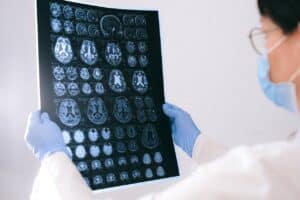
Motion sickness is an all-too-familiar nuisance for many travelers — affecting roughly one in three people — but what if the queasiness you feel on a bumpy ride could hold clues for something far more impactful, like obesity treatments? That’s exactly what a team of researchers from Baylor College of Medicine and their collaborators have begun to uncover.
In a new study published in Nature Metabolism, scientists have identified a previously unknown brain circuit that links the sensation of motion sickness with how the body regulates its temperature and metabolism. This unexpected connection could open the door to entirely new strategies for tackling obesity.
A personal curiosity turns into groundbreaking research
The research was sparked by a simple, personal question. Dr. Longlong Tu, a postdoctoral fellow highly susceptible to motion sickness himself, proposed studying the brain circuits behind it. His mentor, Dr. Yong Xu, professor of pediatrics and associate director for basic sciences at the USDA/ARS Children’s Nutrition Research Center at Baylor, initially wasn’t sold on the idea. Dr. Xu says,
[…] I was not very excited about the idea because it’s not one of the main interests of my lab… However, I became more interested and supported Tu’s idea when he explained the emerging evidence suggesting a link between motion sickness and metabolic balance, which is one of my research interests.
Building a mouse model for motion sickness (without the vomiting)
Studying motion sickness in mice presented a challenge: Mice can’t vomit. But the researchers found a clever workaround. Both humans and mice exhibit a drop in body temperature — hypothermia — when subjected to motion stimuli, such as back-and-forth horizontal movement. Using this as a measurable response, they developed a mouse model that could simulate motion sickness through temperature, activity, and brain monitoring.
The team discovered that motion-activated specific neurons — glutamatergic neurons — in a brain region called the medial vestibular nucleus parvocellular part (MVePCGlu). These neurons are responsible for initiating the body’s thermal response to motion, and when they were activated, body temperature dropped. What’s more, the anti-nausea drug scopolamine blocked this temperature drop, validating that their model accurately mimicked motion sickness responses.
A new frontier: The brain’s role in metabolic health
The study took an exciting turn when researchers started manipulating these neurons beyond motion stimuli. When they inhibited MVePCGlu neurons in stationary mice, the animals’ body temperatures and physical activity levels rose. Even more compelling: These mice ate more food but gained less weight and showed improved glucose tolerance and insulin sensitivity — key indicators of better metabolic health. In other words, targeting this brain circuit could potentially boost energy expenditure and protect against obesity, even in the context of increased food intake.
Rethinking the role of the vestibular system
Traditionally, the vestibular system — the part of the inner ear and brain that helps control balance and eye movements — hasn’t been a focus in metabolic research. But this study changes that narrative. “These results highlight the underappreciated function of the brain’s vestibular system in metabolic balance,” said Dr. Xu. It suggests a fascinating new angle for obesity research: treating metabolic disorders by targeting the same brain regions that trigger motion sickness.
Looking ahead
For Dr. Tu, the study is more than a scientific breakthrough — it’s personal. He hopes that better understanding of the neural basis for motion sickness could lead to improved treatments for his own condition. But now, his personal quest has the potential to impact millions of people facing challenges with obesity and metabolic diseases.
This study is a powerful reminder that sometimes the most unexpected questions lead to the most profound discoveries. And in this case, a queasy stomach might just hold the key to a healthier future.
Your responses and feedback are welcome!
Source: “Unexpected New Clues to Fighting Obesity: Scientists Identify Brain Circuit That May Help Burn Fat,” SciTechDaily.com, 4/19/25
Source: “Motion sickness brain circuit may provide new options for treating obesity,” Baylor College of Medicine, 3/24/25
Source: “Vestibular neurons link motion sickness, behavioural thermoregulation and metabolic balance in mice,” Nature Metabolism, 3/21/25
Image by Anna Shvets/Pexels

 FAQs and Media Requests:
FAQs and Media Requests: 











